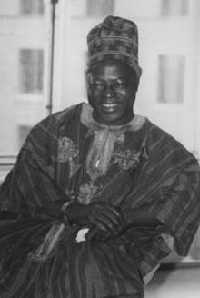 SKC Films Library SKC Films Library |
| SKC Films Library >> General and Old World History >> Africa >> Ghana |
 Hilla
Limann Hilla
LimannPresident of Ghana, 1979-1981 Hilla Babini was born on December 12, 1934, in the village of Gwollu, in the Upper West Region of what was then the Gold Coast. Due to economic hardships with his family, he grew up in the home of his uncle, Hilla Limann. In 1941, when Hilla enrolled in elementary school, he had his last name changed to Limann in appreciation for the chance at the better life his uncle had made possible. Upon completion of his elementary studies in 1945, he enrolled at the government middle school in Tamale. Completing his studies at Tamale in 1949, he enrolled at the government's teacher training college in Tamale. He then took up an academic career. Limann became a district counsellor in the Tumu District Council in 1956, a position he held until 1960. During this period he took a variety of correspondence courses, including a political science course through the London School of Economics. He obtained his degree in French language from Sorbonne University (France) in 1962, continued his studies at the University of Paris, and earned his Doctorate in political science and constitutional law from that institution in 1965. From academia Limann turned to diplomacy, serving in Switzerland as Counsellor under the Ghana Permanent Mission from 1971 to 1975. He returned to Ghana upon completion of his service. On June 4, 1979, the military government of General Fred. W. Akuffa was overthrown in a revolt led by junior army officers, who then installed Flight Lieutenant Jerry John Rawlings as President. Rawlings promised parliamentary and presidential elections would be held by September, and Limann was subsequently tapped by the Peoples National Party (PNP) as its presidential candidate. Despite being virtually unknown to most Ghanaians, Limann defeated the most popular figure in the political scene at the time, Victor Owusu of the Popular Front Party (PFP), by a 62 to 38 percent margin. On September 24, 1979, he was sworn in as President of the Republic of Ghana. President Limann inherited an economy burdened with severe problems. The production of Ghana's main export commodity, cacao, had declined to a record low, which in turn led to a scarcity of foreign exchange. One of Limann's first actions was to launch the Gold Endowment Fund as a means of attracting foreign investors to Ghana. To help curb inflation, he had new currency printed and, in March 1979, ordered all Ghanaians to exchange all old currency for new at the rate of 10 old for 7 new. On December 31, 1981, Limann was ousted by a bloody coup led by Rawlings, who re-established a military government. Limann spent the remainder of his life in near obscurity in his own country, all but ignored by the military regime which had ousted him. He died on January 23, 1998, and was buried in a local cemetery. Dr. Limann was survived by his wife, Fulera Limann, and seven (of eight) children: Lariba Montia, Baba Limann, Sibi Andan, Lida Limann, Danni Limann, Zilla Limann, and Salma Limann. |
| SKC Films Library >> General and Old
World History >> Africa >> Ghana This page was last updated on May 26, 2017. |